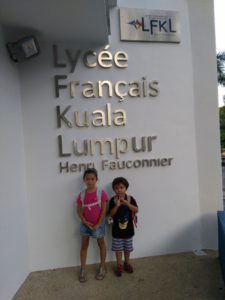Tomoko Jadoulle, Belgian- Japanese family

1. Why did you choose the LFKL?
My husband is Belgian; his mother tongue is French. We are living in Malaysia as expats and will probably go back to Belgium in future. Thus it is important that our children learn to read and write in French fluently.
2. Do your children enjoy the LFKL?
Yes, they enjoy the school a lot. Our two kids (7 and 4 years old) have a lot of fun: teachers are kind with them and they enjoy the activities organized by the school. Every day is a lively experience for them and they (usually) do not complain about going to school.
3. Do you feel like your child is changing and growing in the LFKL?
We come from Malonne, a small village near Namur, in the countryside of Belgium. People in our small village speak only French.
At the LFKL, the children speak many different languages, commonly in English. Since my children entered the French school here in Kuala Lumpur, they play with these kids all day; they automatically learn English while playing with classmates and during English lessons. Now, they can speak several languages. It is Amazing!
They can also learn from other cultures. For example, when the children get into a room such as the library in the LFKL, they remove their shoes. This is specific to the Asian culture, but inside the LFKL, they are in contact with this culture as well and thus seeing it in a different way of living: In Belgium, kids never remove their shoes inside the school. This is a simple example but, overall, we are convinced that it will help our kids grow to be understanding adults.
4. What is the most positive thing about the LFKL?
The teachers, who are all very kind and friendly with the kids.The French teachers are fluent French speakers and also enroll their children in the LFKL. As a result, they can share and understand feelings that other parents have.
5. Do you and your child have some special memories to share about the school, class and activity?
It seems my son (4 years old) is kind with girls (and boys also). He received many invitation letters for birthday parties from girls. This is because he helps other classmates. For example, when they cry, he comforts them and caresses their head. He is not a super hero, but he is a gentleman. He learns to be a good boy at school.
My daughter (7 years old) studies hard during school: practice her pronunciation in French and English, does her homework, learns English, does roller blades and other sport activities. A life filled with fun beginnings for a young girl!
However, since I am Japanese and French isn’t my mother tongue, it is sometimes difficult to help with homework and the bigger the child gets, the harder it would be I’d expect. Luckily, the teachers and my husband are careful and ready to help
Izumi Lostie-Tanaka, French-Japanese family

1. Why did you choose the LFKL?
Since the age of 5-6 years, our two children (now 17 and 13 years old) were in a French school. My husband is French and I am Japanese, and we lived in Tokyo when we decided to enroll our daughter to a French education system. Actually, we had three choices: Japanese school, French school or International (American, British) school. We chose the French school because firstly, I was not satisfied with actual Japanese education system (cram school, severe entrance exam system…). Secondly, for our children who are half Japanese and half French, we think having one solid identity is very important. We did not want our children loose their identity as French and Japanese descendants only to find them struggling from the fact that they fail to recognize their Japanese and French roots. So, we chose the French education system so that they could express themselves at least in one language perfectly. Of course, they also speak Japanese, along with English and Spanish as a plus but they say their native language is French, and I think it is important to recognize their identity. Finally, the choice of the French school was right for us because we moved a lot after Tokyo: we lived in Buenos Aires, Bangkok and now in Kuala Lumpur. Fortunately, there are French schools all over the world in every big city, and the children can take consistent French education program wherever they are until the baccalaureate. Therefore, we naturally chose the LFKL when we arrived at Kuala Lumpur.
2. Do your children enjoy the LFKL?
Yes. In general, children who are in French schools abroad are very open-minded. It is because there are a lot of children of many nationalities, and they themselves often lived in many countries. The difference in culture and exposure between children has therefore become normal for them, and I think it creates a good educational environment.
3. Do you feel like your children are changing and growing in the LFKL?
Our children have just arrived at the LFKL in September, it is still early to say, but my daughter, who is in Terminale (Year 13), has to study very hard. She is preparing hard for her baccalaureate exam, mainly because other children’s level and ambition are very high in unison to hers (students in her class want to apply for Cambridge University, MIT, McGill, Science Po…).
4. What is the most positive thing about the LFKL?
Even if it is a “French school”, the LFKL is also well oriented to International universities. At the LFKL, many children want to go to British, Canadian, Australian or American Universities after their baccalaureate, which surprised me. My daughter said, for example, that in the French school of Bangkok, most of her classmates wanted to apply for French universities and not for other countries. Another positive thing is, since the LFKL is not so big, the teachers and educational staffs take care of the children very well.
5. Do you and your child have some special memories to share about the school, class and activity?
We do not have special episodes yet, but our children always say that the food of school cafeteria is very good! Good nourishment is important for growing children.



